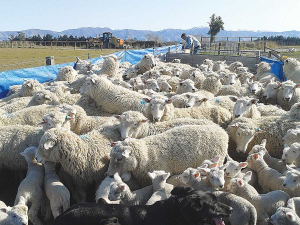MPI Hails Kiwifruit Boom as Horticulture Revenue Surges Past $9 Billion
Ministry for Primary Industries (MPI) Director General Ray Smith is giving a big shout-out to the horticulture sector, especially kiwifruit.
 MPI is reviewing a number of animal welfare codes and advice to farmers for issues like heat stress.
MPI is reviewing a number of animal welfare codes and advice to farmers for issues like heat stress.
MPI says a significant amount of work is under way this year to update animal welfare codes and provide updated advice to farmers for issues such as heat stress.
Ministry for Primary Industries (MPI) veterinarian and director for animal health and welfare Chris Rodwell says, early next month, MPI will – in collaboration with industry partners through the Farm to Processor Animal Welfare Forum – review its work programme after recently completed shade and shelter research.
Rodwell says that while mitigating heat stress in livestock is complex, MPI is confident that this pan-sector discussion will ensure a joined-up approach is taken.
“The industry has already been proactive on this issue and we are looking forward to keeping that momentum going in order to deliver the best welfare outcomes for outdoor livestock.”
Rodwell says it’s important that all options for shade and shelter are on the table, not just man-made infrastructure solutions – such as barns.
“Ultimately, New Zealand’s outdoor farming system is a good thing for our animals. It allows them to behave naturally – including lying down in paddocks – and it reduces the possibility of disease spread,” he explains.
“We want to ensure that during adverse weather, animals have access to protection from the elements – hot, cold or wet weather.
“That may be by using natural features such as trees or scrub, or artificial structures.”
Rodwell says, as well as permanent shelter, farmers can use short-term solutions to protect animals from heat stress – such as altering farm management practices like mustering and milking times.
Improving regulatory standards to manage heat stress in livestock is amongst several pieces of work currently being undertaken by the National Animal Welfare Advisory Committee (NAWAC).
NAWAC is an independent committee formed to give advice on animal welfare to the Minister of Agriculture and the Associate Minister of Agriculture (Animal Welfare).
Working groups are currently reviewing existing codes for dairy cattle and pigs, and a further group is about to commence work on the sheep and beef code. Amongst other things, NAWAC will be looking to strengthen the standards to ensure protection from thermal stress.
These drafts are expected to available for public consultation later in 2021. At that time, the public will be asked to provide their thoughts and feedback on the draft documents.
In other work, NAWAC is developing a code of welfare for breeding birds in the poultry industry, and for farmed fish.
Fonterra’s impending exit from the Australian dairy industry is a major event but the story doesn’t change too much for farmers.
Expect greater collaboration between Massey University’s school of Agriculture and Environment and Ireland’s leading agriculture university, the University College of Dublin (UCD), in the future.
A partnership between Torere Macadamias Ltd and the Riddet Institute aims to unlock value from macadamia nuts while growing the next generation of Māori agribusiness researchers.
A new partnership between Dairy Women’s Network (DWN) and NZAgbiz aims to make evidence-based calf rearing practices accessible to all farm teams.
Despite some trying circumstances recently, the cherry season looks set to emerge on top of things.
Changed logos on shirts otherwise it will be business as usual when Fonterra’s consumer and related businesses are expected to change hands next month.

OPINION: Here w go: the election date is set for November 7 and the politicians are out of the gate…
OPINION: ECan data was released a few days ago showing Canterbury farmers have made “giant strides on environmental performance”.